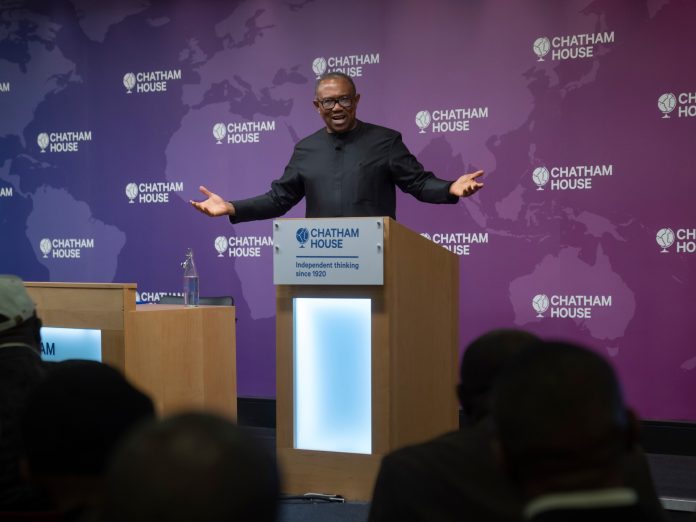Security is also a top priority for the former governor, who in polls leads a packed field, ahead of opponents with better name recognition.
Nigerian presidential candidate Peter Obi has vowed to rid Africa’s most populous nation of endemic corruption and widespread insecurity if he wins elections next month.
Obi, who is one of 18 candidates seeking Nigeria’s highest office, described his country as “a failed state” in need of new political leadership during a speech Monday at the Chatham House international affairs think tank in London.
“Unless we change the policy by changing the political leadership, we will be stuck in this terrible state of underdevelopment and misery,” said Obi, a former governor of the southeastern state of Anambra and a Nigerian Labor Party candidate.
Polls have shown Obi leading the packed field ahead of ruling party candidate Bola Tinubu and main opposition candidate Atiku Abubakar, despite those opponents having greater name recognition. Tinubu is a former Governor of Lagos State and Abubakar is a former Vice President. In 2019, Obi was Abubakar’s running mate under the People’s Democratic Party.
Political analysts have described the February 25 vote to replace President Muhammadu Buhari after eight years in power as a decisive exercise. Since the campaign began late last year, other top contenders have made promises similar to Obi’s. Tinubu has said that he seeks to “renew hope”, while Atiku has said that he will “rescue Nigeria”.
Observers warn that the election is threatened by security challenges, including conflict led by ISIS/ISIL-linked armed groups in the northeast, armed bandits in the northwest and secessionists in the southeast.
On Monday, Obi said he would open a dialogue with the secessionists and vowed to introduce a series of security reforms, especially in the troubled north, where thousands of people have been killed by armed gangs in the past year. Those changes could encourage members of Nigeria’s large diaspora communities to consider returning home and helping development, he said.
“What you have seen is a cumulative effect of leadership failure over the years, which would be resolved by good governance,” he said. “When people start to see justice, equity and inclusive government, all of those things will start to reverse. Nigerians are prepared to return if they find they have a country to return to.”







